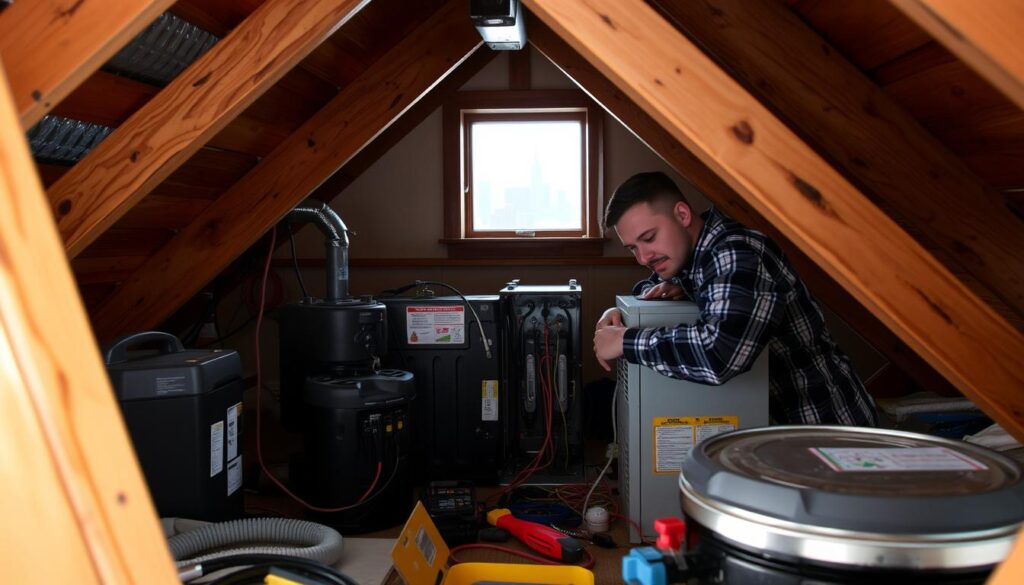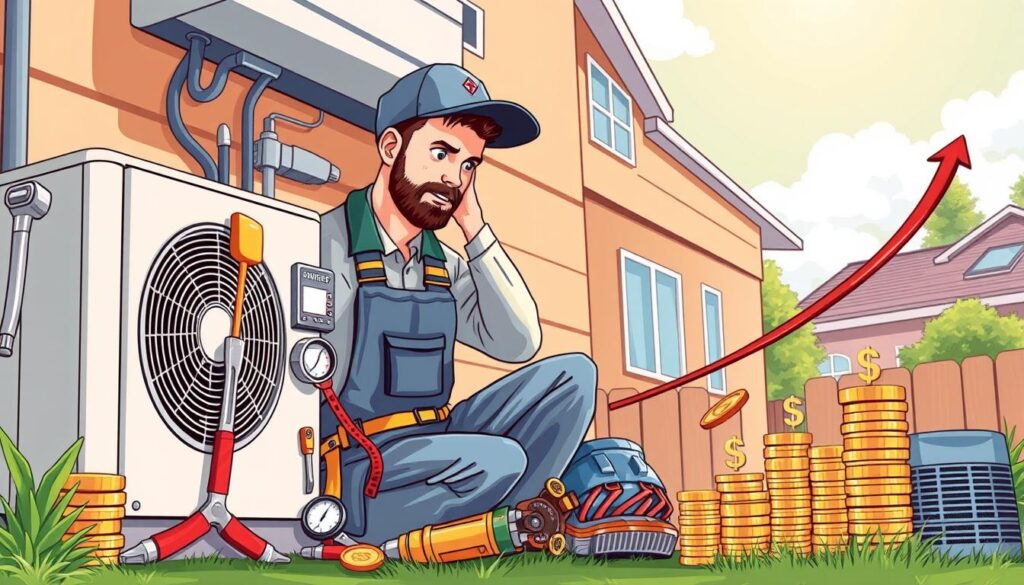Affiliate Disclosure
HVAC Guide Guys is a participant in the Amazon Services LLC Associates Program, an affiliate advertising program designed to provide a means for sites to earn advertising fees by advertising and linking to Amazon.
Do HVAC Workers Get Paid Weekly? “The secret of getting ahead is getting started.” – Mark Twain
As an HVAC technician, you might wonder about your pay. Do HVAC workers get paid weekly? This guide will dive into HVAC worker pay, including salaries and payment schedules. We’ll look at national averages and how pay varies by state and role. Knowing the financial side of HVAC can help you choose the right career path and get fair pay for your skills.

Key Takeaways
- The average annual salary for HVAC technicians in the U.S. is $58,782, or $28.26 per hour.
- HVAC technician salaries can range from $10.24 to $48.73 per hour, with most earning between $22.12 and $31.97 per hour.
- Factors like experience, job responsibilities, and geographic location significantly impact HVAC worker pay.
- The HVAC industry is expected to see 6% job growth through 2032, with an average of 37,700 openings per year.
- Understanding the nuances of HVAC worker compensation, including payment schedules and overtime policies, can help you maximize your earnings potential.
Table of Contents
Understanding HVAC Worker Compensation Basics
As an HVAC technician, your pay can change a lot. It depends on your experience, skills, job tasks, and where you work. All these things play a part in figuring out your salary.
Average National HVAC Salary Rates
The average yearly salary for HVAC techs in the U.S. is about $50,000. But, this number can go up or down a lot. Beginners might earn $30,000, while experts in certain areas can make over $70,000.
Factors Affecting Base Pay
- Years of experience in the HVAC industry
- Level of training and certifications held
- Complexity of job duties and equipment serviced
- Geographic location and cost of living in your area
- Type of employer (e.g., contractor, manufacturer, commercial vs. residential)
Standard Payment Schedules
Most HVAC companies pay their workers in one of three ways: weekly, bi-weekly, or monthly. Weekly pay is getting more common because it’s more steady. Some employers might pay monthly or every two weeks, based on their rules.
| Pay Cycle | Frequency | Pros | Cons |
|---|---|---|---|
| Weekly | Every 7 days | Consistent income, easier budgeting | More administrative work for employers |
| Bi-Weekly | Every 14 days | Fewer payroll runs, lower administrative costs | Can create inconsistent income for workers |
| Monthly | Every 30 days | Simplifies bookkeeping, reduces payroll processing | Longer wait for paychecks, harder to budget |
Explore Our HVAC Shop
Looking for top-rated HVAC tools, parts, and accessories? Visit our shop and find the perfect solution for your needs.
Visit the ShopDo HVAC Workers Get Paid Weekly?
How often HVAC workers get paid can change based on their employer. Some companies pay their HVAC team weekly, while others might pay every two weeks or monthly. Things like company size, industry norms, and local laws can affect how often they get paid.
It’s also important to know about overtime pay. HVAC workers usually get 1.5 times their regular pay for extra hours. Some employers might give extra pay for work on holidays or weekends too.
Experienced HVAC technicians might get paid weekly. This can help them manage their money better. But, in some places or with certain employers, work hours can change. This might affect how much they earn each week or month.
The pay schedule for HVAC workers depends on the company and industry rules. It’s key for HVAC pros to understand how they get paid and overtime rules. This helps them manage their money well and get fair pay for their hard work.
“A specific case highlighted an employer offering a 50/50 split on labor profit, resulting in a lucrative job with a generous work schedule that does not have a slow season, with work hours typically from 8:00 to 5:00, Monday to Friday.”
Most HVAC companies stick to weekly, bi-weekly, or monthly pay cycles. But, there’s a trend towards more frequent pay in the industry. This could help HVAC workers by giving them more steady income and better financial stability.
Explore Our HVAC Shop
Looking for top-rated HVAC tools, parts, and accessories? Visit our shop and find the perfect solution for your needs.
Visit the ShopState-by-State HVAC Salary Variations
HVAC salaries vary a lot across the United States. The highest-paying states and regional pay differences are key. HVAC workers need to understand these variations to make good career choices.
Top 10 Highest-Paying States
- Washington: $32.00 per hour
- New York: $31.85 per hour
- Alaska: $39.48 per hour
- Oregon: $30.42 per hour
- Massachusetts: $30.13 per hour
- North Dakota: $29.77 per hour
- Minnesota: $29.54 per hour
- Hawaii: $29.34 per hour
- Ohio: $29.33 per hour
- Colorado: $29.06 per hour
Regional Pay Differences
HVAC salaries differ a lot in different parts of the country. For example, Washington pays $32.00 per hour, while Florida pays $19.21. These differences are due to cost of living, local economy, and HVAC demand.
Cost of Living Impact
The cost of living affects HVAC salaries a lot. Places like San Francisco, New York City, and Boston pay more to cover living costs. But, areas like the Midwest and South have lower salaries but better purchasing power.
HVAC Payment Structures and Overtime Rules
The HVAC world is complex, with many payment structures and overtime rules. It’s key for both contractors and professionals to know these to get fair pay.
HVAC pay often has a base rate and overtime pay. Overtime is 1.5 times the regular rate for more than 40 hours a week. Some places pay double time on holidays or long shifts.
Payment methods vary, with some getting an hourly wage and others a yearly salary. Special jobs or high-demand areas might offer more pay or bonuses.
“The new federal overtime regulations set a higher salary cap for eligible workers and expanded the types of workers eligible for overtime.”
In 2024, the Department of Labor changed overtime rules. This change means more HVAC workers could get overtime pay. It could change hvac contractor payroll cycle and hvac trade weekly wages.
HVAC contractors need to keep up with these changes. They might need to adjust budgets, use new management, and get time-tracking tools. This helps with accurate records and following new rules.

Knowing HVAC payment and overtime rules helps workers and contractors. It ensures fair and compliant pay in the industry.
On-Call Pay and Emergency Service Compensation
As HVAC professionals, your pay can change a lot. This is because of your job’s demands and responsibilities. It’s important to know how you’re paid for on-call and emergency work. HVAC companies have different rules for after-hours, weekend, and holiday pay.
After-Hours Payment Policies
Many HVAC companies pay a flat rate for being on-call. This rate usually ranges from $50 to $200 per week. If you’re called out for an emergency during off-hours, you might get overtime pay. This is often at a rate of time-and-a-half your regular pay.
Some employers also have a minimum call-out time. This ensures you get paid for your time, even if the repair is quick. This time can be 2-4 hours.
Holiday and Weekend Rate Calculations
Working on holidays and weekends can pay more. HVAC professionals might get time-and-a-half or double-time their regular pay. This can really increase your earnings, especially in peak seasons.
On-Call Rotation Benefits
Some HVAC companies offer extra benefits for on-call work. This can include meal allowances or portal-to-portal pay. These benefits help make up for the disruption to your personal life.
Understanding HVAC professional pay can be tough. But knowing your company’s policies and using your skills can help you earn more. Make sure you’re fairly compensated for your hard work and dedication.
Explore Our HVAC Shop
Looking for top-rated HVAC tools, parts, and accessories? Visit our shop and find the perfect solution for your needs.
Visit the ShopCareer Advancement and Salary Growth
As an HVAC technician, you can really boost your earnings by advancing in your career and gaining specialized skills. The hvac technician pay frequency and hvac salary payment terms change based on your experience, certifications, and job roles.
Specializing in areas like commercial HVAC systems, refrigeration, or system design can increase your pay. These skills often lead to better jobs, especially in larger companies or management positions. Starting your own HVAC business can also lead to a six-figure income for experienced technicians.
Getting more education and certifications is crucial for higher hvac salary payment terms. Certifications like EPA 608, NATE, and HVAC Excellence show your skills. They can help you find better-paying jobs.
| Experience Level | Average Hourly Pay | Average Annual Salary |
|---|---|---|
| 0-5 years | $22.00 | $45,760 |
| 6-9 years | $27.65 | $57,512 |
| 10+ years | $32.83 | N/A |
As you gain more experience, your hvac technician pay frequency will go up. The top 10% of HVAC technicians make about $80,000 a year. This shows the potential for big salary increases in this field.

The demand for HVAC services is growing, with a 9% increase expected by 2033. This is great news for HVAC technicians who keep learning and improving. By staying updated on trends, getting new certifications, and honing your skills, you can have a fulfilling and well-paying career in HVAC.
Benefits and Additional Compensation
HVAC workers often get great benefits on top of their salaries. Many companies pay 100% of health insurance for employees and 75% for family members. They also offer dental, vision, HSAs, and FSAs.
Retirement plans are a big deal, with 401(k) matching from employers. HVAC companies also give paid holidays, PTO, and help with license renewals.
Performance Bonuses
HVAC techs can get bonuses for their work. They might earn spiffs for selling products or finding new customers. Some companies reward them for learning new skills or getting extra licenses.
Commission Structures
For those in sales, commissions are a big part of the job. Technicians can earn a percentage of what they sell. This can really increase their earnings, especially for top performers.
Other perks include tool allowances, company cars, and education support. Some companies even offer profit-sharing or stock options.
Specialized HVAC Roles and Their Pay Scales
In the HVAC world, certain jobs pay more than others. Commercial HVAC techs, system designers, and those with advanced refrigeration skills get paid more. Roles in energy management, building automation, and green tech are also in demand and pay well. Leaders like project managers or service managers earn even more.
The average salary for HVAC workers varies by state and experience. It ranges from $49,400 to $87,700 a year. Entry-level techs start at $52,300, while more experienced ones can earn up to $87,700.
The HVAC field is growing, with 23,000 new jobs by 2032, says the Bureau of Labor Statistics. Since 2023, entry-level HVAC tech salaries have gone up 0.58%. The starting salary is $52,300, rising to $63,500 for intermediate and $74,500 for senior techs.
| HVAC Role | Average Annual Salary |
|---|---|
| Entry-Level HVAC Technician | $52,300 |
| Intermediate HVAC Technician | $63,500 |
| Senior HVAC Technician | $74,500 |
| HVAC Supervisor | $87,700 |
The HVAC industry has many specialized roles, each with its own pay. As the need for energy-efficient and advanced HVAC systems grows, skilled professionals can earn more. This is true in the hvac contractor payroll cycle and hvac professionals payment intervals.
Explore Our HVAC Shop
Looking for top-rated HVAC tools, parts, and accessories? Visit our shop and find the perfect solution for your needs.
Visit the ShopEmployment Types and Payment Frequencies
HVAC workers get paid in different ways. The hvac workers weekly paychecks can change based on their job and the company’s rules.
Full-time HVAC techs usually get paid regularly. They might get paid weekly, every two weeks, or monthly. This makes their income steady. But, part-time or seasonal workers might get paid less often. This depends on how much work they have and what the company needs.
Independent contractors in the hvac trade weekly wages send out invoices. This means their income isn’t always the same. They might get paid for each project or by the hour. Union workers might get different pay and benefits than non-union ones.
Companies also give HVAC workers extra pay and benefits. This includes bonuses, commissions, retirement plans, and health insurance. These extras can really boost how much HVAC workers earn.
“The company boasts no layoffs in 38 years, indicating stable employment for HVAC workers.”
HVAC workers can have great careers with good pay and chances to grow. Knowing how they get paid helps them make better choices. This way, they can earn more and advance in their careers.
Conclusion
HVAC worker compensation changes a lot based on where you work, how long you’ve been doing it, and what you specialize in. You might get paid every week, or it could be every two weeks or a month. It really depends on the job.
The HVAC field pays well, especially if you keep learning and get better at your job. With a 6% job growth from 2023 to 2032, it’s a great time to join. Knowing how pay works in HVAC can help you choose the right path and earn more.

